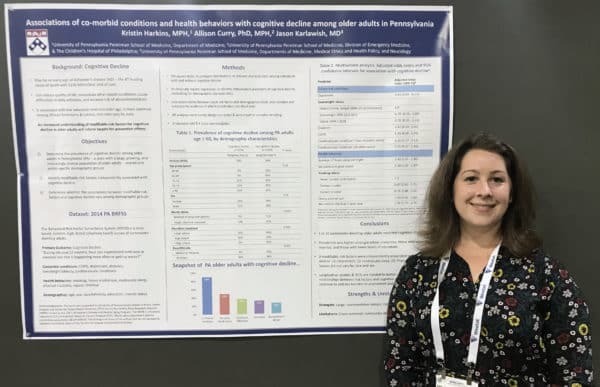by Joyce Lee
Penn Memory Center (PMC) senior research coordinator Kristin Harkins was recently honored for her research on health behaviors associated with cognitive decline.
Harkins and PMC clinical research coordinator Grace Stockbower presented their work at the American Public Health Association conference in Atlanta, GA.
Harkins, who presented her capstone Master of Public Health (MPH) project, was a co-recipient of the Retirement Research Foundation Master’s Student Research Award from the conference’s Aging and Public Health section. The award is for a study that is important to the field of aging, rigorous and organized, and potentially beneficial to the field.
Harkins was interested in identifying modifiable risk factors of cognitive impairment in older adults. By evaluating the health information of more than 4,500 community-dwelling older adults living in Pennsylvania, Harkins found that depression, inadequate sleep, and physical inactivity were strongly associated with the decline of cognitive abilities.
These three factors were all potentially modifiable behaviors that could be targeted with future interventions and prevention efforts. For example, at PMC, a program called Dance for Health is currently looking to promote cognitive health and combat physical inactivity through weekly dance sessions.
Harkins also found that 1 in 10 community-dwelling adults over 60 in Pennsylvania reported cognitive decline, that only a quarter of them discussed the issue with a doctor, and that it was most common among ethnic minorities, those with lower education levels, and those who were single.
“I was grateful for the opportunity to share my work and honored to be recognized with this award,” Harkins said. “I hope that these results can assist in messaging and prevention efforts that will reduce the burden of cognitive decline.
“One startling finding was that only a quarter of individuals with cognitive decline had discussed the issue with a healthcare professional. This emphasizes the need to continue raising awareness and to identify and overcome the barriers to those conversations.”
Harkins’ study was titled “Prevalence and Predictors of Cognitive Decline in Older Adults in Pennsylvania” and was supported by the Penn MPH Program, the Penn Center for Public Health Initiatives, and the Healthy Brain Research Network at the Centers for Disease Control and Prevention (CDC). PMC Co-Director Dr. Jason Karlawish was a co-author of her project.
Stockbower also presented her MPH capstone project, which focused on the creation and dissemination of a guide for safe urban gardening. Her work focused on educating communities about the effects of soil contamination, especially in young children, and promoting best practices for safely gardening in soil that could be contaminated. She collaborated with Penn’s Center for Public Health Initiatives and the Philadelphia Department of Public Health to produce an easy-to-read, pictured handbook on how to safely garden in Philly, linking gardeners to resources they might need to facilitate the implementation of the best practices.
Though her project wasn’t directly related to cognitive aging, Stockbower did point out a connection between her MPH project and the work being done at PMC. Growing your own food has many health benefits, especially when gardening in a community setting.
“When you’re participating in a community garden, there’s a whole added benefit of meeting your neighbors and social interaction,” she said. “A lot of people who we interviewed [about community gardening] talked about bridging generational gaps. So you have grandmothers who are bringing their grandchildren to the garden to garden with them: three generations along the garden, together, which is pretty cool.”
Studies have shown that keeping socially engaged is an important piece of healthy cognitive aging. Several programs at PMC are also focused on creating opportunities for social engagement and intergenerational activity. One example is Building Bridges, a program in which older adults can volunteer to read to young children in the waiting rooms of doctor’s offices.
Stockbower’s study was titled “Urban Gardening: Keeping It Safe, Healthy & Fun through the Development of an Urban Gardeners’ Handbook for Philadelphians.” Her project was supported by the Penn MPH Program and the Agency for Toxic Substances and Disease Registry at the CDC.
Harkins and Stockbower both graduated from the Penn MPH Program in 2017. At PMC, Harkins works on the SOKRATES I & II studies that examine the reaction of cognitively normal older adults to their Alzheimer’s disease biomarkers and risk information, while Stockbower works on the Biogen study that evaluates the effectiveness of a drug called aducanumab in slowing the onset of Alzheimer’s disease.
